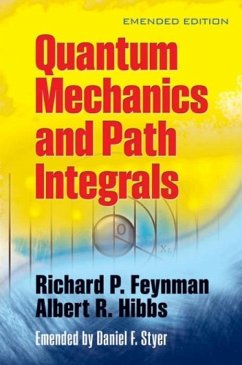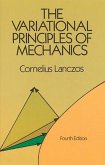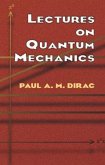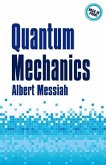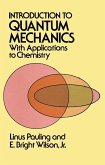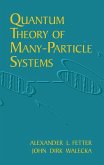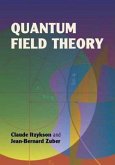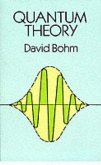- Broschiertes Buch
- Merkliste
- Auf die Merkliste
- Bewerten Bewerten
- Teilen
- Produkt teilen
- Produkterinnerung
- Produkterinnerung
The Nobel Prizeâ winning physicist presents unique insights into his theory and its applications. Feynman starts with fundamentals and advances to the perturbation method, quantum electrodynamics, and statistical mechanics. 1965 edition, emended in 2005.
Andere Kunden interessierten sich auch für
![The Variational Principles of Mechanics The Variational Principles of Mechanics]() Cornelius LanczosThe Variational Principles of Mechanics28,99 €
Cornelius LanczosThe Variational Principles of Mechanics28,99 €![Lectures on Quantum Mechanics Lectures on Quantum Mechanics]() Paul A. M. DiracLectures on Quantum Mechanics10,99 €
Paul A. M. DiracLectures on Quantum Mechanics10,99 €![Quantum Mechanics Quantum Mechanics]() Albert MessiahQuantum Mechanics61,99 €
Albert MessiahQuantum Mechanics61,99 €![Introduction to Quantum Mechanics with Applications to Chemistry Introduction to Quantum Mechanics with Applications to Chemistry]() Linus PaulingIntroduction to Quantum Mechanics with Applications to Chemistry18,99 €
Linus PaulingIntroduction to Quantum Mechanics with Applications to Chemistry18,99 €![Quantum Theory of Many-Particle Systems Quantum Theory of Many-Particle Systems]() Alexander L. And FetterQuantum Theory of Many-Particle Systems31,99 €
Alexander L. And FetterQuantum Theory of Many-Particle Systems31,99 €![Quantum Field Theory Quantum Field Theory]() Claude ItzyksonQuantum Field Theory36,99 €
Claude ItzyksonQuantum Field Theory36,99 €![Quantum Theory Quantum Theory]() David BohmQuantum Theory38,99 €
David BohmQuantum Theory38,99 €-
-
-
The Nobel Prizeâ winning physicist presents unique insights into his theory and its applications. Feynman starts with fundamentals and advances to the perturbation method, quantum electrodynamics, and statistical mechanics. 1965 edition, emended in 2005.
Hinweis: Dieser Artikel kann nur an eine deutsche Lieferadresse ausgeliefert werden.
Hinweis: Dieser Artikel kann nur an eine deutsche Lieferadresse ausgeliefert werden.
Produktdetails
- Produktdetails
- Dover Books on Physics
- Verlag: Dover Publications Inc.
- Seitenzahl: 384
- Erscheinungstermin: 30. Juli 2010
- Englisch
- Abmessung: 235mm x 156mm x 27mm
- Gewicht: 532g
- ISBN-13: 9780486477220
- ISBN-10: 0486477223
- Artikelnr.: 28521686
- Herstellerkennzeichnung
- Libri GmbH
- Europaallee 1
- 36244 Bad Hersfeld
- gpsr@libri.de
- Dover Books on Physics
- Verlag: Dover Publications Inc.
- Seitenzahl: 384
- Erscheinungstermin: 30. Juli 2010
- Englisch
- Abmessung: 235mm x 156mm x 27mm
- Gewicht: 532g
- ISBN-13: 9780486477220
- ISBN-10: 0486477223
- Artikelnr.: 28521686
- Herstellerkennzeichnung
- Libri GmbH
- Europaallee 1
- 36244 Bad Hersfeld
- gpsr@libri.de
Richard Feynman (1918-88) received the 1965 Nobel Prize in Physics for his contributions to the development of quantum electrodynamics. One of the best-known scientists of his generation, Feynman assisted in the development of the atomic bomb and was a prominent member of the panel that investigated the 1986 Challenger disaster. Known worldwide as the voice of NASA's Jet Propulsion Lab, Albert R. Hibbs (1924-2003) studied for his doctorate under Feynman's tutelage and transcribed and edited Feynman's lectures in quantum electrodynamics. Daniel F. Styer holds a Ph.D. from Cornell University and is the John and Marianne Schiffer Professor of Physics at Oberlin College. Richard P. Feynman: The Scientist's Scientist One of the most famous scientists of the twentieth century, and an inexhaustible source of wonderful quotes, Richard Feynman shared the 1965 Nobel Prize in Physics with Julian Schwinger and Sin-Itiro Tomonaga for his contributions to the development of quantum electrodynamics. 1965 was also the year in which Feynman and A. R. Hibbs first published Quantum Mechanics and Path Integrals, which Dover reprinted in a new edition comprehensively emended by Daniel F. Styer in 2010. In the Author's Own Words: "Our freedom to doubt was born out of a struggle against authority in the early days of science. It was a very deep and strong struggle. It is our responsibility as scientists to proclaim the value of this freedom; to teach how doubt is not to be feared but welcomed and discussed; and to demand this freedom as our duty to all coming generations." "I think I can safely say that nobody understands quantum mechanics." "Our imagination is stretched to the utmost, not, as in fiction, to imagine things which are not really there, but just to comprehend those things which are there." "To those who do not know mathematics it is difficult to get across a real feeling as to the beauty, the deepest beauty, of nature. . . . If you want to learn about nature, to appreciate nature, it is necessary to understand the language that she speaks in." -- Richard P. Feynman
Preface 1. The Fundamental Concepts of Quantum Mechanics 2. The
Quantum-mechanical Law of Motion 3. Developing the Concepts with Special
Examples 4. The Schrodinger Description of Quantum Mechanics 5.
Measurements and Operators 6. The Perturbation Method in Quantum Mechanics
7. Transition Elements 8. Harmonic Oscilators 9. Quantum Electrodynamics
10. Statistical Mechanics 11. The Variational Method 12. Other Problems in
Probability Appendix: Some Useful Definite Integrals Appendix: Notes Index
Quantum-mechanical Law of Motion 3. Developing the Concepts with Special
Examples 4. The Schrodinger Description of Quantum Mechanics 5.
Measurements and Operators 6. The Perturbation Method in Quantum Mechanics
7. Transition Elements 8. Harmonic Oscilators 9. Quantum Electrodynamics
10. Statistical Mechanics 11. The Variational Method 12. Other Problems in
Probability Appendix: Some Useful Definite Integrals Appendix: Notes Index
Preface 1. The Fundamental Concepts of Quantum Mechanics 2. The
Quantum-mechanical Law of Motion 3. Developing the Concepts with Special
Examples 4. The Schrodinger Description of Quantum Mechanics 5.
Measurements and Operators 6. The Perturbation Method in Quantum Mechanics
7. Transition Elements 8. Harmonic Oscilators 9. Quantum Electrodynamics
10. Statistical Mechanics 11. The Variational Method 12. Other Problems in
Probability Appendix: Some Useful Definite Integrals Appendix: Notes Index
Quantum-mechanical Law of Motion 3. Developing the Concepts with Special
Examples 4. The Schrodinger Description of Quantum Mechanics 5.
Measurements and Operators 6. The Perturbation Method in Quantum Mechanics
7. Transition Elements 8. Harmonic Oscilators 9. Quantum Electrodynamics
10. Statistical Mechanics 11. The Variational Method 12. Other Problems in
Probability Appendix: Some Useful Definite Integrals Appendix: Notes Index

